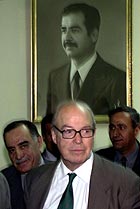Ignorance is Blix
 | There is no lack of people in the media and in academe heaping scorn on the current US administration for not finding the weapons of mass destruction (WMD) in Iraq. I say "the" because simply to refer to them without the specificity of the article leaves room for doubts that should not exist.
The conclusion, which has now become an assumption for many other purposes, has been that the whole WMD thing was concocted by the United States |
Saddam used WDMs repeatedly against Iran, and against his own people in Iraq. The best documented example of these atrocities is probably the Kurdish village of Halabjah. Saddam first used mustard gas (a blistering agent) and Tabun (a nerve agent) against Iranian troops. A group of UN inspectors verified in March 1984 that these agents had been used against Iran. From March through to the summer of 1988, Iraq used hydrogen cyanide against more than 65 Kurdish villages, killing thousands. It is clear that he used them; he must have had them, therefore. Hussein's cousin Ali Hassan al-Majid, the man in charge of Iraq's weapons development program did not acquire the nick-name chemical Ali for nothing.
It is easy, in hindsight, after the still fruitless search for WMDs, to argue for all sorts of conspiracies. The captivating thing about conspiracies has always been the same. It appeals to a certain type of mind. One that is prone to dispense with evidence, for they are convinced that the utter lack of evidence is in itself the proof that there is a conspiracy. Those who are prone to hear voices in the wind will hear voices in the wind no matter what.
Hence the trouble remembering (or accepting) that even the United Nations was convinced that Saddam Hussein possessed WMDs at the time, among which were included France and Germany. There would be no point whatsoever for UN weapons inspection teams to go to Iraq risking their lives if they were all convinced that there were no WMDs. The UN has a reputation for the superfluous sometimes, but that would not explain 16 different resolutions of the Security Council over a period of more than one decade, many of which demanded that the Saddam Hussein regime submit to scheduled and unscheduled weapons inspections, and to destroys his WMDs.
One does not send people to play cat and mouse with a man like Saddam, to look for something that does not exist, if one were convinced that the something did not exist. Of necessity, the UN weapons inspection program after 1984 correctly presupposed the existence of WMDs, among others. In hindsight, and in light of the oil for food record of the UN, it would be all too easy to conclude that the UN was in on the conspiracy. Would that then mean that president Bill Clinton and the UN were in on the conspiracy years before George W. Bush and his team arrived in the White House and decided to invade Iraq?
And what do we make of Hans Blix? Was he also part of the plot? Was he duped with the rest of us? Or was he not a man convinced that he was looking for something that existed. Why were he and the UN asking for more time? Does not the request for more time also assume their own belief that had they had more time they would have found something? Why is it that the absence of WMDs to this day is an indictment on the Bush administration and not an indictment on Hans Blix, the United Nations and the Security Council?
Finally, if Saddam Hussein once had WMDs but destroyed them, why would he not show that he had destroyed them? Why would he not produce evidence that they had been disposed of, and why would he not advise the weapons inspectors and the UN so that they would witness the weapons' destruction or disposal. Why would he not want to have the UN relax the embargo? Why would he not want to avert another war? Or was he in on the conspiracy to oust his own self? Was he really looking forward to having his sons killed and to living in a spider hole?
It is much too easy to omit or forget all of these things. It is much too easy not to ask questions. It is much too easy to criticize GW Bush without having to remember the not-too-distant past, the chemical massacres of the Iran-Iraq war and the murder of so many Kurds. Why does there have to be a conspiracy to explain that for which there is ample evidence. In reality, it was never unreasonable to think that Hussein had WMDs. Considering the record, it was completely unreasonable to assume the opposite.
Ignorance of things past offers the comfort of not having to think about them. When memory is willingly placed on sabbatical, when there is no remembering what preceded today's actions, we are ignorant. Then, we see the events of today as having no connection or relevance to yesterday, the judgments of today are aimlessly floating. The collective memory of what took place not long ago dissipates. Lacking in context and accretion of experience, we come to live today for today in contentment, and all that we now see, we see for the first time.
Picture courtesy of http://www.cockeyed.com/hansblix/hans_first.html










1 Comments:
Hmm. I do agree. I don't think the American puplic would be happy unless they physically saw Saddham dancing upon a nuclear warhead, screaming "Jihad"!... While it's routine to poke fun at "military intelligence", it IS still fairly reliable.
T
By Anonymous, at 1/25/2005 10:57:00 PM
Anonymous, at 1/25/2005 10:57:00 PM
Post a Comment
<< Home